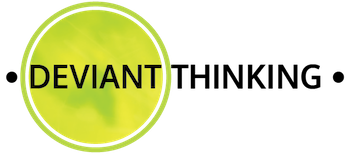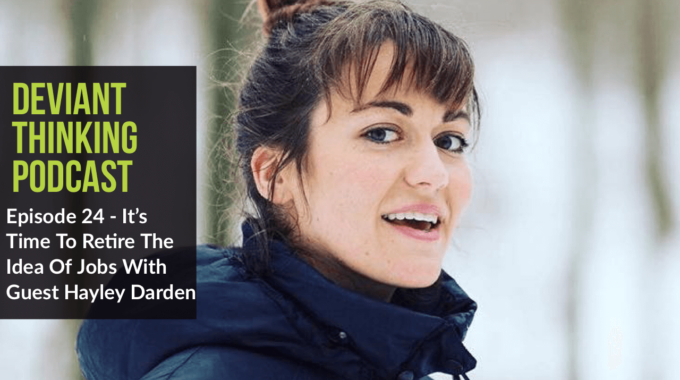CLICK HERE TO DOWNLOAD THE TRANSCRIPT (PDF VERSION) Jennifer Thompson 00:00 Welcome back to The…
CLICK HERE TO DOWNLOAD THE TRANSCRIPT (PDF VERSION)
00:01 Welcome back to the Deviant Thinking Podcast. I’m your host, Jennifer Thompson and today and always, we will explore Career Advice that Breaks the Rules. Super excited to have you here today. Happy New Year everyone! It is an exciting time of the year. It is a time to reset, plan, start to think about the future. We can all relax now – the holidays are over – all of that craziness – and focus on our future. So you’re probably thinking we’re going to dig into your typical goal setting new year’s resolution type podcast. Well, I’m not going there at all. I’ve got a twist for you. As we hit the new year, I want to talk about telling your story. Yep. Telling your career story because I find when people know their story and where they’re going, that’s when they find success in their careers. So it’s really owning that story about you and what you want to tell people and getting really comfortable in your own skin.
01:16 If I have a wish for all of my clients for this year, it is to really own who they are, be proud of their past and look forward to a future of great accomplishments. And you do that through owning your career story. So as we get started today and you hear me talking about story, you might wonder, is this really for you? Do you need to own a career story? Well, I think everyone needs to think about their story and I’m going to even expand it to be on career. It really is your life story and who you are, what you’ve accomplished and where you want to go. I know that when my clients get clear on all of these things and really get comfortable with them and really enjoy the experiences they’ve had in their past, and know where they’re going in their future, and be able to talk about it in a concise and clear manner –
02:22 that’s when my clients really excel. So if you don’t know your story, you don’t know how to talk about yourself and you don’t know how you should communicate your future. This episode is for you. Well, what does it mean to own your story? That’s a phrase I often use and for me that is ownership of the good, the bad, and the future. So the good, those are those accomplishments that you’ve had in the past. They’re the things that you’re proud of and that it’s easy to talk about. The bad. Well, I have a theory about bad or failed attempts. Actually, I really hate those words. I hate the word fail because I feel like that means that you didn’t accomplish anything when you’ve failed. I have yet to find a client who’s truly failed at something. What I find instead is that most people have learned something.
03:35 So to me, learnings need to be a big part of your story. Even if something didn’t work out, even if it wasn’t the most exciting thing, even if you took that job that ended up ending quickly, you learned something from it. So learnings are big part of your story. And then my favorite part, the future as the song goes, you know, your future is yet unwritten. So you get to write your future and tell others where you’re going, what you’re excited about, and what you want to accomplish in the future. So that’s what owning your story is, is really knowing who you are, what you’ve done and where you want to go. Let’s start with why story is important. Well, there’s two reasons for me that make story important. First of all, is story is part of the human DNA. It is as old as the first communication that we’ve had with each other.
04:52 Our brains are wired for story. History is passed down through story. Learnings are passed down through story. It is the way we as humans connect. So story is super important. We all want to know each other’s story. All you have to do is walk into a library and see the millions and millions of stories around us to know how much we as human beings value story. Also story makes it easy for people to remember us and help us stand out as individuals. So the other reason story is important is that it keeps us interesting and memorable. What I know, and I say this over and over on this podcast, is what I know is that interesting people get ahead. The statistics clearly say that between equally qualified people, interesting people get the job, they get the promotion, they move ahead. So really knowing your story and how you can communicate is super important.
06:14 Story is a major focus in the work that I do with clients and I focus on story again for these reasons, but it’s also something that’s the hardest for people to wrap their heads around and it’s hard for them to talk about themselves. You know, most of our stories that we make up about ourselves often come, unfortunately, from the views of others. So I want clients to really own their own story and determine what they want to share and what they want to tell others about themselves and their future. I want you to be proud to tell that story because it’s so important to growing your career. In today’s podcast, I’m going to dip into that story side of things, but know that this is just the tip of the iceberg. There’s so much that you can do with story around your career. So where does story come in?
07:15 Well, story again, it’s how we interact as human beings. So in our career we use story in many different places. Probably the most prominent though, and the one that makes people the most nervous is when we have to tell stories in an interview setting. Another place that we use story is in our reviews and in our discussions with our managers, our bosses, directors, and telling them about our accomplishments. So taking some time to focus on our stories and really know what we want to share is very important. So how do you know what’s part of your story? Well folks, it all comes back to the basics. And for me the basics always start with our values. What’s important to us? What is it that we want others to know about us? Well, when we know our own values, it becomes easy to find those things that we would like to highlight.
08:22 If you don’t know your own values, that is the exercise that you need to do first. Take that time and really think about what’s important about you. If you need help in determining your values and some great exercises around values, we cover that in Episode 3 where we talk about Company Culture because Company Culture and Your Fit has to do with your values. So definitely check out that episode, I’ll link to it in the show notes and it’ll give you a good idea on how to determine your values. So now back to values. Why is it an important part of your story? Again, when you know something’s important to you, that’s what you want to make sure you share. So if I know creativity is important to me, I want to be able to share to others, that I’m going to creatively approach situations – I’m going to bring newness, I’m going to bring excitement, and that needs to be part of my story.
09:31 The other part of my story definitely needs to be about the future because while I’ve had a great past and I’m really proud of it and I have a great story I can talk about there, when I’m talking about my career, a big part of the reason I’m talking about it is because I’m positioning myself for where I want to go in the future. So again, looking
at that value side of things, if I’m in a role that doesn’t let me use my creativity, I may want to be again, talking about those values and how I want to use it in the future. So that’s the first place I look in building my story and in helping my clients build their stories, is really focusing on what do we value and how do we communicate that to others. The second part I look for in story, is stories that make us interesting. Stories that allow others to learn more about us and remember us. So those stories might be, or the parts of those stories might be, about some of our accomplishments or the things we’ve done uniquely. They may even be a story about a major failure that we’ve had, but a failure where we learned so much from that we know it’s an important part of what made us who we are today. So stories focus on both those values that we have and our accomplishments. It’s really the combination of both.
11:13 So how do we use story now that we know what we want to put into our story, the things that we value and our accomplishments that help us make us unique. We need to know when to use story. Well, the number one place that I find my clients use story is in an interview setting and they often feel flat-footed if they don’t prepare their story beforehand. The number one question that anyone gets asked in an interview is ‘tell me about yourself’. Right? All of us have heard that question or maybe asked it of others. And what we really want at that point is a concise and accurate portrayal of our career story. So what makes a good, ‘tell me about yourself’ story? Well, I promise you it doesn’t start with I was born on a small farm in the heart of the middle of this country.
12:22 Nope, that’s not where it starts for a career. Our careers story really should be focused on again, who we are, what we value, and some of those major accomplishments that we’ve had. So when you hear a question like, ‘tell me about yourself’ or maybe it comes out as, ‘can you highlight a few things about your career?’ There’s many ways that question can be phrased. I want you to first of all, rephrase that question in your mind and we should always start with, tell me about yourself at your best. Of course, the most important part of that is you at your best. That’s what people really want to hear about your career. They don’t want to know the pitfalls. They don’t want to know the hard things that have happened. They definitely don’t want to know that you have a boss that’s frustrating the crap out of you.
13:20 They want to know about you at your best because that’s what they’re interested in. So the first thing you need to do when you think about your story, especially that very basic story about yourself, the ‘tell me about yourself’ story is really consider who are you at your best and what do you want people to know? And you want them to know what you value, right? That’s always going to be that foundational building block. So you want them to know what you value and some of your major accomplishments. The third thing that people want to know in that ‘tell me about yourself’ statement is they want to know where you’re going. So while you’re telling them about you at your best and where you’ve been the best in the past, you want to tell them where you’re going and why you will be even better in the future.
14:20 That really helps them know how they can help you and if you fit into a role they have or a position they might be making, or if you’re offering a service, you know, that you would be a good fit for that as well. So it really takes in those three components, your values, your accomplishments, and where you’re going next and what you want to contribute in the future. When you put all of those three components together, you really hit a great story to start things off and introduce yourself. So that’s the number one question that you get asked in an interview and everyone knows that one’s coming, but I find the one most people dread is that ‘Can you tell me why you are leaving this current role?’ Or ‘Can you tell me about why you’ve left this job or what happened here?’ You know, it’s those questions that maybe throw us, you know, it’s the ones maybe we don’t want people to ask us because maybe we didn’t leave on the best note.
15:30 So how do you tell a story about that? How do you position yourself to be a candidate that looks wonderful going forward, even if you’re a little bit nervous about where you’re leaving, right? That’s really what the focus of this needs to be for you is setting yourself up so that people can know, like, and trust you and want you to join their team. So often when I hear this question come up, or they say that it’s the one that they dread, again there’s usually some form of shame in it. And I want clients to know that there should be no shame in leaving. There is no shame in having a bad boss, there’s no shame in having a position that wasn’t a perfect fit for you. So that’s often how I tell clients to answer the question. One should never be leaving a job because of a crappy boss, a bad situation, a lack of good management, any of those things, no one wants to hear your dirty laundry -that’s not part of the story.
16:39 But, if you focus on you and your future, it becomes easy to tell the story. So even if you’re leaving a role in which things aren’t going well, you can still talk about your future forward. So if you’re being laid off or you’re on a employee performance plan, you don’t want to bring that up. Again, you’re not telling them about the worst of you, you want to keep it in that mind of what’s the best of you. But if you’re looking at leaving, there is a hope, a dream, a wish of what you want to contribute in the future. So if someone asks you that question, you can state clearly what your future state is. Well, I’m currently looking for a role that allows me to use my creativity more. While I’ve learned a ton at the current role that I’m in, I’m not able to be as creative as I want to be.
17:36 And from everything I see in the position that you’ve advertised, there’s a lot of opportunity for creativity. That’s a great answer folks. That is that future focus. And again, it’s you owning your story. Doesn’t mean that you’ve got a jerk of a boss who’s not letting you be creative and you know you can contribute more and all they do is harp on you and you’re just sick of it. No one wants to know that part. They want to know what you can contribute going forward. So looking towards that forward-looking side of story helps answer those hard questions. I find anytime you get stuck in those hard questions of, well, why did you do this? What’s going on here? How come? How come there’s a gap in your, your job, you know, even there, if you look back, it’s a very similar answer. Well, I left position A because I wanted more flexibility, wanted to be able to create more, I wanted to contribute more new knowledge.
18:34 I wanted to learn more, whatever it is that you wanted to, to have different than your last role. And I found, you know, again, if you’re talking about a gap, you might need to add in, you know, and I’ve found it took a little while to find the perfect role that would allow me to do those things. So I did take my time and allowed myself to have that gap in my career because I didn’t want to take the first job that came along. So again, you can see how owning that story, deciding about what you wanted for your future fills those really hard questions. For others who have a gap in their career., maybe again, it was a very calculated gap. I always love to hear people talk about what they learned in that time.
19:29 If you took off and went and got additional education, if you took time to learn about a new career, it’s also part of your story. Anytime you can focus on what makes you special, unique, and how you’re bettering yourself with each position that you have and how you’re growing yourself, people like to hear those stories. It makes them feel comfortable. It makes them understand that that’s who you’ll be in the future. So I bring all this up as we hit the new year because I want to empower you to really own that story. When you own your own story, you feel really good about yourself, you’re confident in things, you’re really reframing that story to highlight the best of you. And I believe each of you are pretty darn awesome and when you can own that story and really talk about that future focus of who you are, we gain more confidence, we’re more excited in the future, we’re optimistic and we can really help push ourselves ahead.
20:41 So I do love story and I encourage you all to really think about the stories that you want to tell about your career and where you’re going in the future. So hopefully today was a little bit of a twist on the normal new year kind of podcast. As I promised you, there was no goal setting, no resolutions, no word of the year, but it was really about owning who you are and being proud of that and being able to tell that story. Thanks for joining me for today’s podcast and Happy New Year everyone. If you enjoyed this podcast, it would mean the world to me if you’d hop on over to iTunes and give us a quick review. Those reviews really make my day and I love to read what people say. So if you would just take a second, I would so appreciate it. Until next time, Be Deviant. I look forward to our next episode. Thanks so much.




